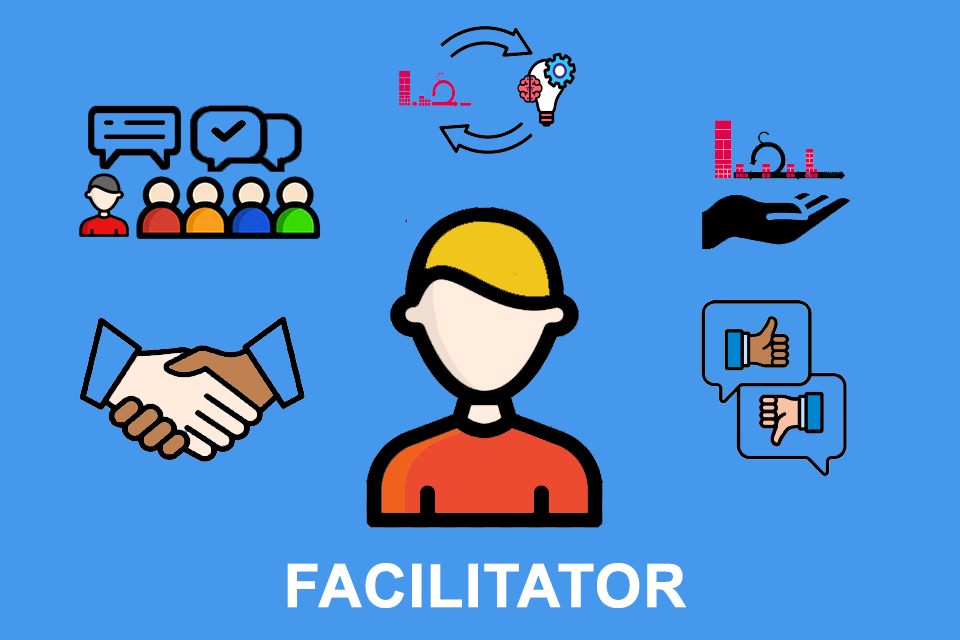What is a Facilitator?
Facilitator – A multifaceted role and activity
The term “facilitator” is derived from the English verb “facilitate”, which means to enable, lighten or empower. There are many translations for the noun:
- mediator,
- guide,
- enabler,
- coordinator,
- supporter,
- moderator, and
- discussion leader,
- trainer and also
- tugboat (for illegal entry into a country).¹
At the latest with the triumph of Scrum, a framework with events, accountabilities and artefacts for the development of complex products and services, the term facilitator is increasingly used in organisations.
It is striking that the activity of the moderator in particular is often emphasised – which on the one hand is not wrong, since moderator is a direct translation of the term, but on the other hand also falls short, because a facilitator is more than “just” a moderator; it is a euphemism for a person who does many things in personal union. This person supports people to work better together. He or she coordinates the togetherness, guides the transfer of knowledge, mediates when problems arise or helps to make decisions.
In short, a facilitator is an important role with multiple activities in an organisation.
Tasks of a facilitator
Depending on the context and the organisation, the tasks of a facilitator may differ. A person who takes on this role can, for example,
- lead meetings, workshops or discussions and ensure that all participants contribute their points of view and work together in an open and constructive way.
- mediate in conflicts or difficult conversations between staff or groups and create a neutral space where participants can discuss their concerns and seek solutions. In other words: helping people to help themselves.
- support the learning process in further education and training by actively involving participants or conveying content in a comprehensible way.
- assist in the development of strategies and goals, and bring insights, approaches or underlying frameworks – e.g. Scrum – into the organisation.
Essentially, the role of the facilitator is to create a supportive and conducive environment in which participants can freely express their ideas, develop their own solutions and make decisions. Two things are important to emphasise here:
- A good facilitator does not intervene in the content of discussions and does not take an active role in finding solutions. It is about accompanying the process and supporting the participants on the way to a common goal.
- A facilitator is not a supervisor.
Requirements for a facilitator
A good facilitator should have a number of skills and qualities to be effective. The person who takes on this role should
- have excellent communication skills, be able to listen actively and be understanding of the needs and viewpoints of the group members.
- be neutral and objective, without showing personal bias or preference, in order to equally respect and promote the opinions and ideas of all participants.
- be empathetic to participants’ feelings and perspectives, as empathy contributes to a supportive and respectful environment.
- be able to recognise conflict and develop appropriate strategies for resolution to ensure that discussions remain productive.
- be flexible and able to adapt to different situations and groups to meet participants’ needs.
- be able to use different creative approaches to encourage participants to develop new ideas and find innovative solutions.
- have technical knowledge, where appropriate, to ask informed questions and steer discussions in a focused direction.
- be experienced in responding to different situations and applying best practices.
Overall, it is important that a facilitator creates a positive and supportive atmosphere for people to work together effectively and achieve desirable outcomes.
Impulse to discuss
How important is it for the success of the method that it starts on a Monday and not, for example, on a Thursday?
Notes (partly in German):
If you like the article or would like to discuss it, please feel free to share it in your network. And if you have any comments, please do not hesitate to send us a message.
[1] Leo.org: Translations for Facilitator
In the current Scrum Guide, which defines Scrum with its rules, the term facilitator does not appear. This is surprising, because the Scrum Master is considered a prime example of a facilitator. He helps the participants to promote cooperation among themselves and with each other. In addition, he also works in the direction of the organisation as a whole and imparts knowledge about the framework.
“Those who reduce Scrum Masters to facilitation and team assistance have not yet grasped that behind the role lies a servant leader who empowers, not mothers, the team and the organisation.” A German-language flash of inspiration from Thomas Michl.
We are happy to recommend Jacob Chromy’s Facilitation Rundschau, in which he regularly presents interesting content.
And here you can find additional information from our t2informatik Blog:



